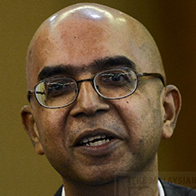At 6pm on the first day of Chinese New Year (Thursday), fifteen policemen went to the home of S. Arutchelvan, secretary-general of Parti Sosialis Malaysia. They confiscated documents, a computer, a modem and a mobile phone, and arrested Arul for sedition.
Arul is an outspoken man who is known for remaining calm in tense standoffs between the police and the rakyat. Arul’s modus operandi is to create opportunities to display injustices. The police knew Arul had never resorted to violence and is not a flight risk.
The police knew Arul would have responded, as he had on many previous occasions, to an invitation to come to a police station and cooperate with investigations. Yet, the police chose to disrupt the festive celebrations of Arul, his family and friends.
They held him overnight in a common lock-up in Dang Wangi police station. Then they sought a remand order to detain him for more days to “investigate” him. Thanks to an alert magistrate and a team of pro bono lawyers, Arul was released at 7pm the next day.
Three days later, at 9.45pm on Sunday, several policemen went to the home of Parti Keadilan Rakyat Youth chief and assemblyman for Seri Setia, Nik Nazmi Nik Ahmad to arrest him for illegal assembly. They took him to Dang Wangi police station, then to the central lock-up in Jinjang.
They had tried unsuccessfully to arrest him earlier together with activist Adam Adli outside the Sogo shopping complex in Kuala Lumpur. Both had spoken at a rally protesting the verdict in the trial of Datuk Seri Anwar Ibrahim.
Tan Sri Muhammad Shafee, the Umno lawyer who was appointed prosecutor to try Anwar, has been on a road show with Khairy Jamaluddin, Umno Youth chief and minister of youth and sports. The show’s goal is to justify(!) the verdict of the judges of the Federal Court. At the shows, Shafee promotes his lawyering skills and reveals what was said in camera during the Anwar trial.
Members of civil society are outraged by the actions of the police and Shafee in the wake of the Anwar verdict – others who have been arrested include Malaysia’s much-loved cartoonist Zunar, Taiping MP Nga Kor Ming and Bersih 2.0 activist Thomas Fann.
The outrage of civil society is also fanned by the arrest in January of prominent human rights lawyer Eric Paulsen over a tweet in which he suggested some sermons issued by Jakim (Malaysia’s Department for Islamic Development) promoted extremism.
Civil society is incensed not only by the arrests of those who stand up against injustices and by the shamelessness of Shafee and Khairy, but also by the Inspector-General of Police Tan Sri Khalid Abu Bakar’s use of Twitter to inflame passions. One example will suffice: the IGP tweeted a picture of lawyer Paulsen together with the word “biadap” (rude). Even if Paulsen was rude, how is that a crime?
It doesn’t help that this same IGP, in June 2014 – contrary to established precedent and apparently without prior consultation with the attorney-general (A-G) – defied a High Court order to locate and return a child to her mother; he chose instead to “respect” a shariah court order (the A-G now defends the IGP).
Members of the government often say that those who are vocal do not speak for the silent majority. Forgetting they lost the popular vote in GE13, they insist they speak for “the silent majority”. Well, they’d better think again.
Today, in conversations with several active members and leaders of Malaysian human rights organisations, I heard examples of disquiet in the police force. The police, many of whom seek to be good Muslims, have expressed frustration over the arrests and prosecutions only of “the opposition”, terming it one-sided justice.
Just as Major Zaidi Ahmad emerged in the Air Force, similar just persons may emerge in the police force.
There is also discord between the police and ruling politicians. The best-known example is the case of the alleged Malaysian gambling kingpin Paul Phua whom the Home Minister Datuk Seri Zahid Hamidi said was not a member of the 14K triad, despite the police having previously said the opposite. (The home minister subsequently claimed he only said what amounts to “14K doesn’t operate in Malaysia, so Paul cannot have been a member ‘in Malaysia’”; he’s also declared that it’s a matter of national security, so no more can be said).
Leaders of civil society say the high-handed arrests on flimsy charges, the tweets and the boasts are radicalising Malaysians: causing more to become advocates of far-reaching changes. They say more Malaysians, even those in the police force, are eager to exit the ranks of the silent majority. Whom have the arrests, boasts and tweets helped? – February 26, 2015.
* This is the personal opinion of the writer or publication and does not necessarily represent the views of The Malaysian Insider.


Comments
Please refrain from nicknames or comments of a racist, sexist, personal, vulgar or derogatory nature, or you may risk being blocked from commenting in our website. We encourage commenters to use their real names as their username. As comments are moderated, they may not appear immediately or even on the same day you posted them. We also reserve the right to delete off-topic comments